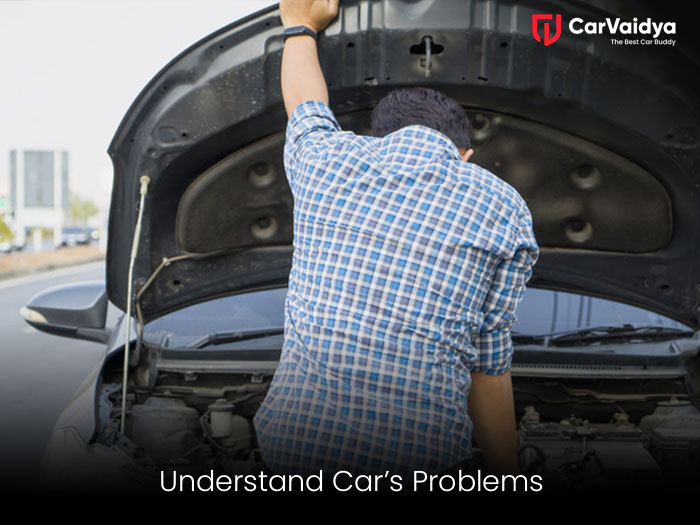Understanding Your Car Service Problems


 By CarVaidya
By CarVaidyaUnderstanding your car's service problems can be daunting, especially if you're not well-versed in automotive jargon. However, having a basic knowledge of common car issues and their symptoms can save you time, money, and stress. This guide will help you identify and understand typical car service problems, ensuring you can communicate effectively with your mechanic and make informed decisions about your vehicle's maintenance.
The engine is the heart of your car, and when it has issues, your vehicle's performance can be significantly affected. Here are some common engine problems:
An engine misfire occurs when one or more of your engine's cylinders fail to combust the fuel-air mixture correctly. Symptoms include a rough idle, poor acceleration, and increased fuel consumption. Causes can range from faulty spark plugs and ignition coils to fuel system issues.
Engine overheating is a critical problem that can lead to severe damage if not addressed promptly. Symptoms include a high temperature gauge, steam from the hood, and a sweet smell (coolant). Common causes include low coolant levels, a faulty thermostat, or a broken water pump.
Oil leaks are noticeable by oil spots under your car or a burning oil smell. Causes can include a worn-out oil pan gasket, valve cover gasket, or oil filter. Addressing oil leaks is essential to prevent engine damage.
The transmission is responsible for shifting gears in your vehicle. Transmission issues can range from minor inconveniences to major problems that require costly repairs.
Transmission slipping occurs when your car changes gears unexpectedly or struggles to stay in the intended gear. This can be due to low transmission fluid, worn-out gears, or a failing clutch in manual transmissions.
If your vehicle hesitates or delays when shifting gears, it could indicate low transmission fluid, a clogged filter, or a failing transmission solenoid.
Transmission fluid is typically red and slippery. Leaks can be caused by a damaged transmission pan, gasket, or seals. It's crucial to address fluid leaks to maintain proper transmission function.
Your car's braking system is vital for safety. Brake issues can compromise your ability to stop the vehicle effectively.
Squeaking brakes often indicate that the brake pads are worn and need replacement. Grinding noises suggest that the pads are completely worn out, and metal is contacting metal, which can damage the rotors.
A soft brake pedal can be caused by air in the brake lines, low brake fluid, or a failing master cylinder. This issue requires immediate attention to ensure your brakes function correctly.
Vibrations or pulsations when braking can indicate warped brake rotors. This can happen due to excessive heat buildup or improper installation. Resurfacing or replacing the rotors can resolve this issue.
Modern cars rely heavily on electrical systems, making electrical issues particularly frustrating.
A dead battery is a common issue and can be caused by leaving lights on, a failing alternator, or an old battery that needs replacement. Symptoms include a clicking sound when turning the key and dimming lights.
The alternator charges the battery and powers electrical systems while the engine runs. Signs of a failing alternator include dimming headlights, a battery warning light, and electrical issues. Replacing the alternator usually resolves these problems.
Fuses protect your car's electrical circuits. If a fuse blows, it can disable specific functions like lights or the radio. Replacing the blown fuse with one of the same rating can fix the issue, but frequent blows may indicate an underlying problem.
The suspension and steering systems are critical for vehicle control and comfort.
Uneven tire wear can be caused by misaligned wheels, worn suspension components, or improper tire inflation. Regular tire rotations and alignments can help prevent this issue.
Noises when turning the steering wheel, such as clunks or squeaks, can indicate worn-out steering components like ball joints or tie rods. Addressing these issues promptly can prevent more extensive damage.
A bouncy or excessively rough ride often points to worn-out shock absorbers or struts. Replacing these components can restore a smooth ride and improve handling.
The exhaust system removes harmful gases from your engine and reduces noise.
A loud exhaust noise can be caused by a hole in the exhaust system, such as the muffler or exhaust pipe. This issue not only affects noise levels but can also impact emissions.
The check engine light can indicate an issue with the exhaust system, such as a faulty oxygen sensor or catalytic converter. A diagnostic scan can help identify the specific problem.
If you smell exhaust fumes inside the car, it could indicate a leak in the exhaust system. This is a serious issue as it can lead to carbon monoxide poisoning and should be addressed immediately.
Understanding your car's service problems can empower you to take better care of your vehicle and communicate effectively with your mechanic. Regular maintenance and timely repairs are crucial to keeping your car running smoothly and safely. By familiarizing yourself with common car issues and their symptoms, you can catch problems early and avoid costly repairs down the road. Remember, when in doubt, consult a professional mechanic to diagnose and fix any issues with your vehicle.
Tips For Charging Your Car Battery During A Road Trip


0 Comments